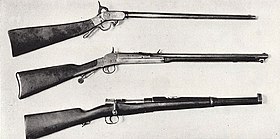Supplying the Confederacy
United States Flintlock Musket and Flintlock rifles
Modern Civil War guns (rifiled carbines) of 1863
The senior director of Sinclair, Hamilton and Company was Archibald Hamilton, a Confederate sympathizer, a senior director of the firm Fraser, Trenholm and Co, and an arms expert who was familiar with every arms manufacturer in England, and frequently arranged business with them. During this time he also served as the director of the London Armoury Company, another leading small arms purchasing house in London. [8] [9] [10] Directors of Sinclair, Hamilton & Company included, Robert Adams, Richard Ashton, Archibald Cockburn, John Shorter, merchants, William Dray, an engineer and manufacturer, and George Fry who acted as solicitor. [11] [12]
Charles K. Prioleau, a senior partner of Trenholm, became interested in supplying the Confederacy in an attempt to salvage his business when the cotton trade, which was vital to both the economies of the Confederate states and the numerous mills in Lancashire, collapsed as a result of the Civil War and the Union Blockade. Prioleau's business dealings with the Confederacy involved sending arms and supplies to those states, and soon grew and was involved in the purchasing and outfitting warships for its war effort. [12]
Many of the arms sold by Sinclair, Hamilton and Company came from Robert Taylor Pritchett, a British gun maker and inventor, and a business man who like many others arms dealers took advantage of the financial opportunities the American Civil War offered. Pritchett was well known for his designs and innovations of Enfield rifles. [13]

The Confederate States of America (CSA), commonly referred to as the Confederate States (C.S.), the Confederacy, or the South, was an unrecognized breakaway republic in the Southern United States that existed from February 8, 1861, to May 9, 1865. The Confederacy comprised eleven U.S. states that declared secession and warred against the United States during the American Civil War. The states were South Carolina, Mississippi, Florida, Alabama, Georgia, Louisiana, Texas, Virginia, Arkansas, Tennessee, and North Carolina.

Arms trafficking or gunrunning is the illicit trade of contraband small arms, explosives, and ammunition, which constitutes part of a broad range of illegal activities often associated with transnational criminal organizations. The illegal trade of small arms, unlike other organized crime commodities, is more closely associated with exercising power in communities instead of achieving economic gain. Scholars estimate illegal arms transactions amount to over US$1 billion annually.
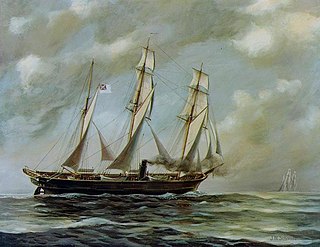
The Alabama Claims were a series of demands for damages sought by the government of the United States from the United Kingdom in 1869, for the attacks upon Union merchant ships by Confederate Navy commerce raiders built in British shipyards during the American Civil War. The claims focused chiefly on the most famous of these raiders, the CSS Alabama, which took more than sixty prizes before she was sunk off the French coast in 1864.

The Confederate States Army, also called the Confederate Army or the Southern Army, was the military land force of the Confederate States of America during the American Civil War (1861–1865), fighting against the United States forces to win the independence of the Southern states and uphold and expand the institution of slavery. On February 28, 1861, the Provisional Confederate Congress established a provisional volunteer army and gave control over military operations and authority for mustering state forces and volunteers to the newly chosen Confederate president, Jefferson Davis. Davis was a graduate of the U.S. Military Academy, and colonel of a volunteer regiment during the Mexican–American War. He had also been a United States senator from Mississippi and U.S. Secretary of War under President Franklin Pierce. On March 1, 1861, on behalf of the Confederate government, Davis assumed control of the military situation at Charleston, South Carolina, where South Carolina state militia besieged Fort Sumter in Charleston harbor, held by a small U.S. Army garrison. By March 1861, the Provisional Confederate Congress expanded the provisional forces and established a more permanent Confederate States Army.

CSS Sumter, converted from the 1859-built merchant steamer Habana, was the first steam cruiser of the Confederate States Navy during the American Civil War. She operated as a commerce raider in the Caribbean and in the Atlantic Ocean against Union merchant shipping between July and December 1861, taking eighteen prizes, but was trapped in Gibraltar by Union Navy warships. Decommissioned, she was sold in 1862 to the British office of a Confederate merchant and renamed Gibraltar, successfully running the Union blockade in 1863 and surviving the war.
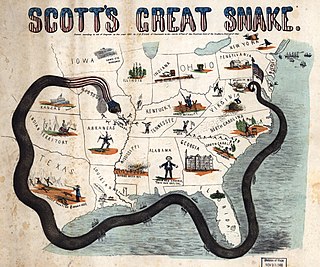
The Union blockade in the American Civil War was a naval strategy by the United States to prevent the Confederacy from trading.

Kerr's Patent Revolver was an unusual 5-shot single-action revolver manufactured from 1859 to 1866 by the London Armoury Company. It was used by Confederate cavalrymen during the U.S. Civil War. Seven of these revolvers were held by the New Zealand Colonial Defence Force in 1863 and were issued to the famous Forest Rangers at the start of the campaign to push Māori rebels out of the Auckland province. It is easily recognized by its side-mounted hammer.

The London Armoury Company was a London arms manufactory that existed from 1856 until 1866. It was the major arms supplier to the Confederacy during the U.S. Civil War. The same company name was used during World War I to import arms from America such as the Colt New Service Revolver in 455 Eley.
The Confederate States of America (1861–1865) started with an agrarian-based economy that relied heavily on slave-worked plantations for the production of cotton for export to Europe and to the northern US. If classed as an independent country, the area of the Confederate States would have ranked as the fourth-richest country of the world in 1860. But, when the Union began its blockade of Confederate ports in the summer of 1861, exports of cotton fell 95% and the South had to restructure itself to emphasize the production of food and munitions for internal use. After losing control of its main rivers and ports, the Confederacy had to depend for transport on a delicate railroad system that, with few repairs being made, no new equipment, and destructive raids, crumbled away. The financial infrastructure collapsed during the war as inflation destroyed banks and forced a move toward a barter economy for civilians. The Confederate government seized needed supplies and livestock. By 1865, the Confederate economy was in ruins.
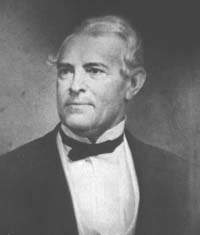
George Alfred Trenholm was a South Carolina businessman, financier, politician, and slaveholding planter who owned several plantations and strongly supported the Confederate States of America. He was appointed as its Secretary of the Treasury during the final year of the American Civil War.

James Dunwoody Bulloch was the Confederacy's chief foreign agent in Great Britain during the American Civil War. Based in Liverpool, he operated blockade runners and commerce raiders that provided the Confederacy with its only source of hard currency. Bulloch arranged for the purchase by British merchants of Confederate cotton, as well as the dispatch of armaments and other war supplies to the South. He also oversaw the construction and purchase of several ships designed at ruining Northern shipping during the Civil War, including CSS Florida, CSS Alabama, CSS Stonewall, and CSS Shenandoah. Due to him being a Confederate secret agent, Bulloch was not included in the general amnesty that came after the Civil War and therefore decided to stay in Liverpool, becoming the director of the Liverpool Nautical College and the Orphan Boys Asylum.

Josiah Gorgas was a Confederate general in the American Civil War and was later president of the University of Alabama.

The Enfield Pattern 1853 rifle-musket was a .577 calibre Minié-type muzzle-loading rifled musket, used by the British Empire from 1853 to 1867; after which many were replaced in service by the cartridge-loaded Snider–Enfield rifle.
The United Kingdom of Great Britain and Ireland remained officially neutral throughout the American Civil War (1861–1865). It legally recognized the belligerent status of the Confederate States of America (CSA) but never recognized it as a nation and neither signed a treaty with it nor ever exchanged ambassadors. Over 90 percent of Confederate trade with Britain ended, causing a severe shortage of cotton by 1862. Private British blockade runners sent munitions and luxuries to Confederate ports in return for cotton and tobacco. In Manchester, the massive reduction of available American cotton caused an economic disaster referred to as the Lancashire Cotton Famine. Despite the high unemployment, some Manchester cotton workers refused out of principle to process any cotton from America, leading to direct praise from President Lincoln, whose statue in Manchester bears a plaque which quotes his appreciation for the textile workers in "helping abolish slavery". Top British officials debated offering to mediate in the first 18 months, which the Confederacy wanted but the United States strongly rejected.

Caleb Huse was a major in the Confederate States Army, acting primarily as an arms procurement agent and purchasing specialist during the American Civil War. He is most well known for his successful acquisition of weapons contracts with various European nations including the United Kingdom, Austria, and to a lesser extent, France, Prussia, and Bohemia. A majority of the weapons imported to the Confederacy from foreign powers during the war were negotiated for and purchased by Huse.
Blakely rifle or Blakely gun is the name of a series of rifled muzzle-loading cannon designed by British army officer Captain Theophilus Alexander Blakely in the 1850s and 1860s. Blakely was a pioneer in the banding and rifling of cannon but the British army declined to use Blakely's design. The guns were mostly sold to Russia and the Confederacy during the American Civil War. Blakely rifles were imported by the Confederacy in larger numbers than other Imported English cannon. The State of Massachusetts bought eight 9 in (23 cm) and four 11 in (28 cm) models.

During the American Civil War, blockade runners were used to get supplies through the Union blockade of the Confederate States of America that extended some 3,500 miles (5,600 km) along the Atlantic and Gulf of Mexico coastlines and the lower Mississippi River. The Confederacy had little industrial capability and could not indigenously produce the quantity of arms and other supplies needed to fight against the Union. To meet this need, numerous blockade runners were constructed in the British Isles and were used to import the guns, ordnance and other supplies that the Confederacy desperately needed, in exchange for cotton that the British textile industry needed greatly. To penetrate the blockade, these relatively lightweight shallow draft ships, mostly built in British shipyards and specially designed for speed, but not suited for transporting large quantities of cotton, had to cruise undetected, usually at night, through the Union blockade. The typical blockade runners were privately owned vessels often operating with a letter of marque issued by the Confederate government. If spotted, the blockade runners would attempt to outmaneuver or simply outrun any Union Navy warships on blockade patrol, often successfully.
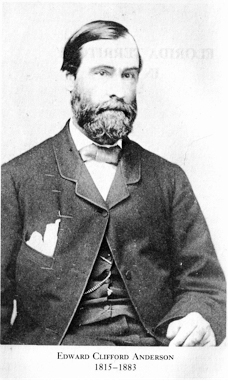
Edward Clifford Anderson Sr. was a naval officer in the United States Navy, Mayor of Savannah, Georgia and a Colonel in the Confederate States Army during the American Civil War. He commanded Fort James Jackson near Savannah before its capture in 1864. He was elected mayor of Savannah eight times, before and after the war, and on December 6, 1865, he became the first mayor after the civil war.
S. Isaac, Campbell & Company in London started out as a boot manufacturer for the British military and later became one of the largest suppliers of arms and military wares to the Confederacy during most of the American Civil War. Before the war the firm handled large contracts for the British military, but after a corruption scandal it lost its privilege of doing any sort of business with the British government. The company then turned to supplying British militia, and then to the desperate Confederacy, which quickly became their largest customer. Confederate business and purchases of arms in Britain was conducted mostly by Confederate Major Caleb Huse, and his associate Major James Bulloch who acted as chief purchasing agents and diplomats for the Confederacy. Ultimately, it was the Confederacy's enormous debt to Isaac, Campbell & Company that was the primary cause of the company's ruin.

Charles Kuhn Prioleau (1827–1887) was an American cotton merchant who became the senior partner of Fraser, Trenholm & Company in Liverpool, England, a firm that functioned as the European banker of the Confederacy and was its major supplier for arms and military ware during the American Civil War. As a firm that frequently acted as the European banker of the Confederacy it often extended it credit, and was sometimes referred to as "the Confederate Embassy in England".

